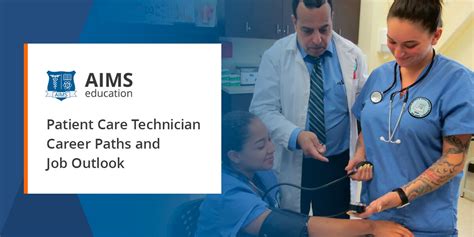The healthcare industry is one of the fastest-growing sectors in the world, and the demand for skilled professionals is on the rise. One of the most rewarding and in-demand careers in healthcare is that of a Patient Care Technician (PCT). In this article, we will delve into the world of PCT careers, exploring what they do, the skills required, and the job outlook for this exciting profession.
What is a Patient Care Technician?

A Patient Care Technician is a healthcare professional who works directly with patients, providing basic care and support under the supervision of a licensed healthcare provider. PCTs are also known as Certified Nursing Assistants (CNAs) or Nursing Assistants (NAs). Their primary role is to ensure the comfort, safety, and well-being of patients, while also assisting with medical procedures and administrative tasks.
Responsibilities of a Patient Care Technician
The responsibilities of a PCT can vary depending on the work setting, but some common tasks include:
- Taking vital signs (temperature, blood pressure, pulse)
- Assisting patients with bathing, dressing, and grooming
- Helping patients with mobility and transfer (e.g., from bed to wheelchair)
- Providing basic care and support with activities of daily living (ADLs)
- Assisting with medical procedures (e.g., drawing blood, administering medications)
- Maintaining patient records and reporting any changes or concerns to healthcare providers
- Providing emotional support and comfort to patients and their families
Skills Required to be a Successful Patient Care Technician

To be a successful PCT, you will need to possess a combination of skills, including:
- Compassion and empathy
- Good communication and interpersonal skills
- Ability to work well under pressure and in a fast-paced environment
- Basic knowledge of medical terminology and procedures
- Physical stamina to lift, move, and transfer patients
- Ability to maintain confidentiality and adhere to HIPAA guidelines
- Strong observational and reporting skills
- Ability to work effectively as part of a healthcare team
Education and Training Requirements

To become a PCT, you will typically need to complete a post-secondary training program in patient care technology or a related field. These programs are usually offered at vocational schools, community colleges, or technical institutes and can take several months to a year to complete.
Some common training programs for PCTs include:
- Certificate programs in patient care technology
- Diploma programs in nursing assistance
- Associate's degree programs in healthcare or a related field
- Certified Nursing Assistant (CNA) training programs
Certification and Licensure

While certification is not always required to work as a PCT, it is highly recommended. The National Healthcareer Association (NHA) offers a Certified Clinical Medical Assistant (CCMA) certification, while the American Red Cross offers a Certified Nursing Assistant (CNA) certification.
To become certified, you will need to meet the eligibility requirements, pass a certification exam, and complete continuing education requirements to maintain your certification.
Job Outlook for Patient Care Technicians

The job outlook for PCTs is excellent, with the Bureau of Labor Statistics (BLS) predicting a 11% growth in employment opportunities from 2020 to 2030, which is faster than the average for all occupations.
Some of the factors driving the demand for PCTs include:
- An aging population with increased healthcare needs
- Advances in medical technology and treatments
- A growing focus on preventative care and patient-centered care
- A shortage of skilled healthcare professionals in certain regions
Salary Range for Patient Care Technicians
The salary range for PCTs can vary depending on factors such as location, employer, level of experience, and certification. However, according to the BLS, the median annual salary for nursing assistants, including PCTs, was $30,830 in May 2020.
Here are some average salary ranges for PCTs in different industries:
- Hospitals: $30,000 - $45,000 per year
- Long-term care facilities: $25,000 - $40,000 per year
- Physician offices: $28,000 - $42,000 per year
- Home healthcare: $25,000 - $38,000 per year
Conclusion
A career as a Patient Care Technician can be a rewarding and challenging profession for those who are passionate about healthcare and patient care. With the demand for skilled PCTs on the rise, this career path offers excellent job prospects and opportunities for advancement.
If you are considering a career as a PCT, we encourage you to explore the education and training requirements, certification options, and job outlook in your area.






What is the average salary for a Patient Care Technician?
+The average salary for a Patient Care Technician can vary depending on factors such as location, employer, and level of experience. However, according to the Bureau of Labor Statistics (BLS), the median annual salary for nursing assistants, including PCTs, was $30,830 in May 2020.
What are the education and training requirements for a Patient Care Technician?
+To become a Patient Care Technician, you will typically need to complete a post-secondary training program in patient care technology or a related field. These programs are usually offered at vocational schools, community colleges, or technical institutes and can take several months to a year to complete.
What are the job prospects for Patient Care Technicians?
+The job outlook for Patient Care Technicians is excellent, with the Bureau of Labor Statistics (BLS) predicting a 11% growth in employment opportunities from 2020 to 2030, which is faster than the average for all occupations.
